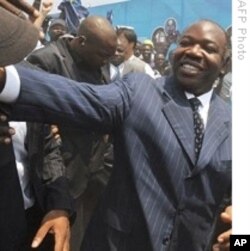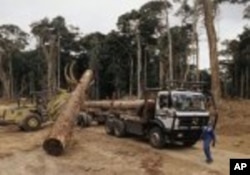Gabon is diverse in people, history, and ecology. Lee White says a new exhibit in the capital, Libreville, is an ambitious effort to display that diversity. He is one of the organizers of the show and the director of Gabon’s national park system.
“We’ve tried to bring together,” says White, “the geological history of Gabon going back billions of years, the history of the evolution of humans with stone tools going back 400,000 years before homo sapiens, all of the natural heritage of Gabon, the natural ecosystem, and the rich cultural [and political] history” through colonialism and independence.
“[President Ali Ben Bongo Ondimba] is in a hurry to develop this country,” he says, “and this exhibit is one indication of how serious he is.”
So are actions taken in recent days. On the eve of the celebrations, the government signed four major agreements worth $U.S. 4.5 billion with multinational companies from India and Singapore. The deals are expected to improve Gabon’s infrastructure, build social housing projects and create over 50,000 jobs.
In remarks at the opening ceremony of the exhibit, President Bongo called for unity and asked all citizens to help make the country “an emerging economic force” within five years.
White sees Gabon’s development as an effort to balance exploitation of the country’s natural resources with preservation. He says, for example, there must be a balance between the need to exploit the country’s natural forests and protecting its more than 10,000 plant species and rare species of fish, monkeys and other wildlife.
“It’s our responsibility to maintain the forest cover because things we do here in terms of forest management will have an impact on the climate of the Sahel region, which will be one of most severely impacted [by climate change] on the planet.
“One of the threats to Gabon is that, as climate change affects [neighboring] northern Nigeria and the Sahel, people will have to move south into the forest area” in part to look for food and work. For White, one solution is to develop, in a sustainable way, the country’s savannah where he says crops can be planted without destroying the forests.
White says both he and President Bongo believe in good governance, and with wise management of its natural resources, a “sleepy rainforest country” could emerge into a self-sufficient nation, and even a food exporter.





